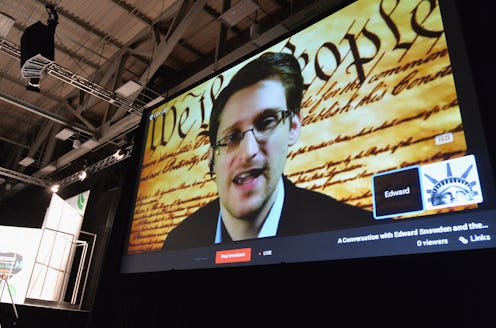News
What Is Edward Snowden Saying At SXSW?
Finally, we got to hear from the man himself. On Monday, Edward Snowden appeared at the South by Southwest Interactive conference, at an ACLU panel discussing government surveillance. This marked his first public appearance — albeit by Google Hangout — since Snowden leaked hundreds of thousands of hyper-classified documents last summer, promptly fleeing to Hong Kong and then to Russia, where he was given temporary asylum. "The irony that we're using Google Hangouts to talk to Edward Snowden is not lost on any of us," speaker and privacy researcher Chris Soghoian said wryly.
"The NSA is setting fire to the future of the Internet," Snowden told the audience. Shortly afterwards, he said that he was speaking to the SXSW community — the Interactive festival, at which Snowden spoke, is focused on emerging technology — because he wanted to encourage technical solutions to the problem of Internet surveillance by governmental agencies. "You are all the firefighters," he said. After he finished, he received a standing ovation.
He asserted his belief that intelligence should be target-specific, rather than the kind of widespread surveillance tactics the NSA uses on millions of Americans. If security agencies had invested their efforts into traditional intelligence rather than Web spying, he added, the Boston marathon bombers might have been caught in advance.
In a not-so-great advertisement for Google Hangouts, the connection was spotty and Snowden's statements, though generally audible, sounded crackly. He used his first public appearance (sort of) to speak passionately against the long-term storing of data, explaining that Web giants like Facebook and Google could use data "in a responsible way," and not hold it for any longer than needed for business purposes.
“If we allow the NSA to continue unrestrained," Snowden warned, "every other government will accept that as a green light to do the same.”
Interesting, Tim Berners-Lee, otherwise known as the founder of the Internet, used the conference as a means to openly thank Snowden, noting that he believed the former NSA analyst had acted in the public interest.
"Encryption does work," Snowden assured the audience. "It's the defense against the dark arts in the digital realm." He recommended using an array of tools to prevent anyone being able to spy on your Web activity: full-desk encryption; browser plug-ins to block surveillance; and Tor, a mixed-routing network.
Snowden will face charges of espionage if he returns to the United States anytime soon, but accepted an invite to the SXSW conference with fellow whistleblowers Glen Greenwald and Julian Assange.
After months of staying out of the public eye, it's speculated that Snowden might be returning to the spotlight for a shot at getting asylum with a country that, well, isn't Russia. It's no secret that Russia has restrictions on Internet freedom, which runs in stark opposition against the reason Snowden is there in the first place, and Snowden had reached out to more than a dozen other countries before ending up there. In December, he wrote an impassioned letter to Brazil, openly asking for permanent asylum in the country.
Snowden joins Greenwald and Assange at the ACLU panel, which will be — no surprise here — centered around the topic of the limits of government surveillance. Greenwald famously broke the Snowden story while working for the Guardian last year, and recently moved to Rio de Janeiro with partner David Miranda. Assange, of course, is still holed up in the Ecuadorian embassy in London, which "is a bit like prison," he told the SXSW audience Saturday.
"The NSA has grown to be a rogue agency," Assange told interviewer Benjamin Palmer in a video call. "It has grown to be unfettered … the ability to surveil everyone on the planet is almost there, and arguably will be there within a few years. And that’s led to a huge transfer of power from the people who are surveilled upon, to those who control the surveillance complex.”
The chief point made by Assange was his call to the public: To stand up against what he described as the brutal invasion of their privacy rights. "How is it that the Internet, that everyone looked upon as perhaps the greatest tool of human emancipation there had ever been, had been co-opted, and was now involved in the most aggressive form of state surveillance ever seen?” Assange demanded.
Greenwald will address the SXSW audience later Monday, at 4.30 EST.
